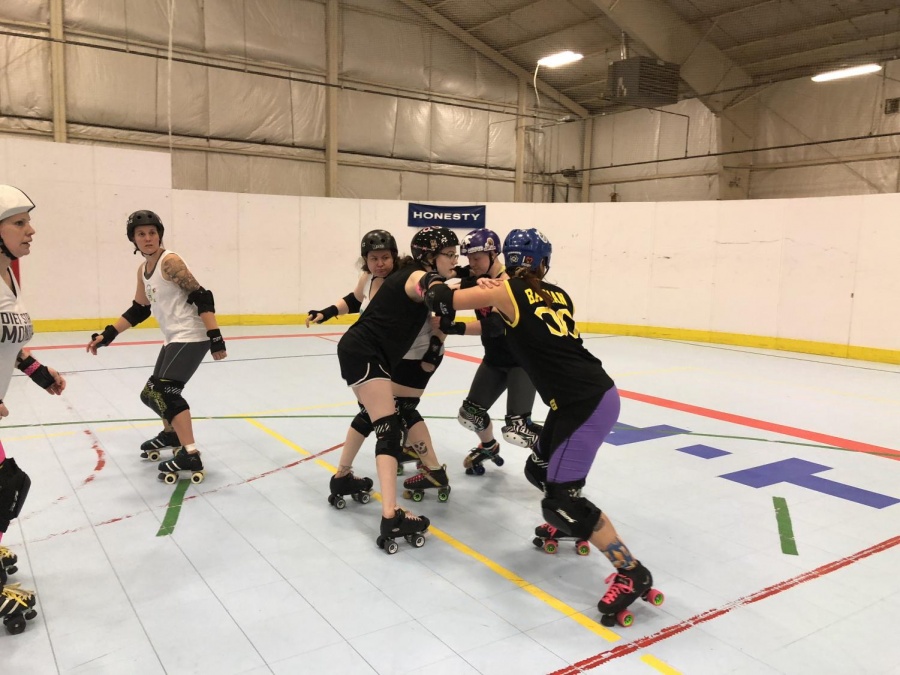‘Hey, Millennial Falcon!’: My roller derby life
Barbed Wire Betties practing a braced-wall drill in Sycomore. Pictured from left to right, Demon, Slaughtermelon, Millennial Falcon and TsumAmy.
April 26, 2018
Roller derby has a way of finding people at just the right moment.
I first found roller derby while I was struggling to find a group I fit with. I was active-duty military living in the Metro-East St. Louis area and was not happy with my current life. I was depressed, but undiagnosed.
One of the amazing humans in my personal training group at my gym played roller derby. I remember looking up to her from the moment I met her. She was fierce: so strong and athletic. At that time, I knew I was moving away within the next six months and was not sure I wanted to start something new, but she convinced me to jump in.
I attended an informational night, which they called “Date the Crush,” and I was hooked! I joined the Confluence Crush Roller Derby’s “fresh meat” and down the rabbit hole of derby I went!
Derby has its own culture and its own “language” surrounding it. You are not “new to the team” you are “fresh meat.” The skills you must learn include, “whips,” “knee taps,” and “hip checks.” We lovingly refer to all of our bumps and bruises as “derby kisses.” Finally, the term “recycling” is not a reference to saving the planet, rather, it’s about coming back together to play defense.
So, what the HECK even is roller derby?
Everyone always wants to know if modern roller derby is like what was on TV in the 70s and 80s. The short answer is no, however, we are still on quad-style roller skates, NOT “roller blades,” and we are still skating on a track in a counter-clockwise direction.
Most leagues today skate “flat track” style, meaning we are not on a large banked track. This means a track can be laid (usually with tape and rope) on any surface you can roller skate on.
We focus much more on the athletics than the theatrics. We are required by our governing body, Women’s Flat Track Derby Association (WFTDA), to wear full gear (a helmet, mouth guard, elbow pads, wrist guards and knee pads) and to learn specific minimum skills before being put on a roster for a “bout,” or game.
WFTDA has an entire rule book of game play and structure for leagues to follow. Members must pass a written test prior to being able to play against other teams. This assures members know how the game is played and understands the importance of safety. Similar to hockey, we have a penalty system where skaters are sent to “the box” if they violate a rule. This helps keep the other skaters and referees safe and keeps the game play focused.
How the game is played
A bout is two periods of 30 minutes each with unlimited number of “jams.” At the beginning of each jam, the two teams put five players on the track—four blockers and one jammer. The jammer wears a star over their helmet and are the offensive player that scores the points by making their way through “the pack.”
The pack is the largest numbers of blockers together on the track. A point is scored for each opposing team’s blocker passed while upright and in bounds. This is where the hard hitting and excitement happens.
As the jammers try to score those points, the blockers have two objectives: keep the opposing jammer from scoring and help your own jammer through the pack. The first or initial “pass” though the pack, establishes “lead jammer” and is scoreless.
The lead jammer has the ability to call off the jam early, hence the unlimited number of jams per period. One additional roll to mention is the “pivot.” The pivot wears a stripe on their helmet; they are typically one of the more experienced players on the team.
This blocker has the unique ability to become the points-scoring jammer mid-jam if their team’s jammer passes them the star helmet cover.
The culture of derby
Perhaps the most recognizable part of derby culture is the derby names players choose for themselves. The first right of passage most derby players undergo is passing out of Fresh Meat. Each league sets their own specific rules for this but the general rule is passing enough minimum skills to be “contact eligible” (being able to scrimmage and start giving and taking hard hits) and attending enough practices and events to be a league member.
The most exciting part of this step is picking your derby name, the name that will go on your jersey and that your teammates will now start calling you. Say good-bye to Kellsie and hello to Millennial Falcon!
I chose this name because I am a huge Star Wars nerd while simultaneously being one of the youngest people in my friend group, the “token millennial” if you will. Most of my teammates call me Falcon for short—actually many of my non-derby friends have started calling me that too and I will always respond to “Hey, Falcon!”
For me, the most important part of derby is the friendships and support that comes from being a part of this sport. I have met amazing people who would not exist in my regular social circles outside of derby. When I am having a low mental health day, I don’t have to defend myself-—I can be honest and take a night off.
Derby is an amazingly welcoming community for those of us in the LGBTQA* community. WFTDA has made many statements about gender inclusivity and I know many, many queer/non-straight and trans (transgender, non-binary, etc.) identifying individuals who love derby as much as I do.
Transferring to a new school this fall will be scary, but I know that I can transfer to a new derby league and have an instant circle of friends. Within the last school year, I have transferred from the local recreational league, Illinois Valley Vixens, to the Barbed Wire Betties out of DeKalb.
It’s not easy to balance school and commuting to DeKalb twice a week plus travel to numerous away bouts, but I have such a passion for the sport that it is worth it for me. Derby gives me a place to be athletic and be myself that I have not found anywhere else. The sport gives me something to work hard at and gives me an opportunity to better myself.
Here at IVCC, I know at least two other current derby skaters. Katie “Slaughtermelon” Baker, first-year nursing student. She is currently skating with the Barbed Wire Betties competitively and with the Illinois Valley Vixens recreationally. Ami Marshall-Jeffries, second-year nursing student, has recently joined the Illinois Valley Vixen’s fresh meat program and has volunteered with the Betties!




